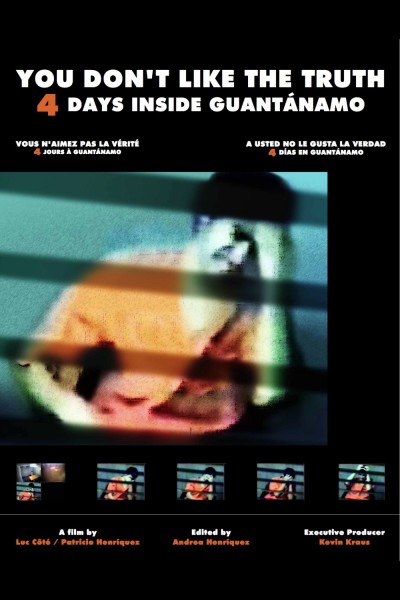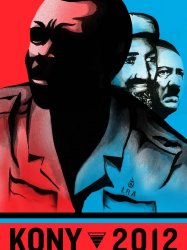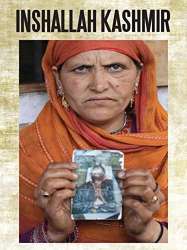You Don't Like the Truth: 4 Days Inside Guantanamo est un film de genre Documentaire réalisé par Luc Côté
You Don't Like the Truth: 4 Days Inside Guantanamo (2010)

Si vous aimez ce film, faites-le savoir !
Genres Documentaire
Themes La prison, Le terrorisme, Documentaire sur le droit, Documentaire sur la guerre, Documentaire historique, Politique
Note72%










You Don't Like The Truth: Four Days Inside Guantanamo is an award-winning 2010 documentary. The film focuses on the recorded interrogations of Canadian child soldier Omar Khadr, by Canadian intelligence personnel that took place over four days from February 13–16, 2003 while he was held at Guantanamo. It presents these with observations by his lawyers and former cell mates from the Bagram Theater Internment Facility and Guantanamo Bay detention camps.
The film premiered at the Festival du nouveau cinéma in Montreal in October 2010. The film was shown to Canadian parliamentarians in October 2010. Khadr's defence attorney's planned to show the film during their summation if Khadr's trial went forward. According to the Montreal Gazette the film-makers Luc Côté and Patricio Henriquez also produced a series of short YouTube videos as a companion to the feature-length documentary.
Bande annonce de You Don't Like the Truth: 4 Days Inside Guantanamo
Bluray, DVD
Streaming / VOD
Commentaires
Postez un commentaire :
Suggestions de films similaires à You Don't Like the Truth: 4 Days Inside Guantanamo
Il y a 0 films avec le même réalisateur, 8965 ayant les mêmes genres cinématographiques, 9530 films qui ont les mêmes thèmes (dont 2 films qui ont les mêmes 6 thèmes que You Don't Like the Truth: 4 Days Inside Guantanamo), pour avoir au final 70 suggestions de films similaires.Si vous avez aimé You Don't Like the Truth: 4 Days Inside Guantanamo, vous aimerez sûrement les films similaires suivants :

Toute ma vie (en prison) (2008)
, 1h39Réalisé par Marc Evans
Origine Royaume-uni
Genres Documentaire
Thèmes La prison, Le terrorisme, Documentaire sur le droit, Documentaire sur la guerre, Documentaire historique, Documentaire sur la politique, Documentaire sur le terrorisme, Politique, La peine de mort, Documentaire sur la police
Acteurs Mos Def, Snoop Dogg
Note66%





Au moment même où William Francome nait, le 9 décembre 1981, un homme est arrêté pour le meurtre d’un policier de l’autre côté de l’Atlantique. Cet homme est noir, journaliste et ancien Black Panther. Il s’appelle Mumia Abu-Jamal.

The Cats of Mirikitani (2006)
, 1h14Genres Documentaire
Thèmes Les attentats du 11 septembre 2001, La prison, Le racisme, Religion, Le terrorisme, Transport, Aviation, Documentaire sur l'art, Documentaire sur la discrimination, Documentaire sur le droit, Documentaire sur la guerre, Documentaire historique, Documentaire sur une personnalité, Documentaire sur la politique, Documentaire sur la religion, Documentaire sur les technologies, Documentaire sur le terrorisme, Politique, Religion musulmane, Documentaire sur la Seconde Guerre mondiale, Film catastrophe, Film de catastrophe aérienne, Détournement d'avion
Note81%





In 2001 Japanese American painter, Jimmy Mirikitani (born Tsutomu Mirikitani), and over 80 years old, was living on the streets of lower Manhattan. Filmmaker, Linda Hattendorf, took an interest and began

Kony 2012 (2012)
, 30minutesRéalisé par Jason Russell
Origine Etats-Unis
Genres Documentaire
Thèmes Afrique post-coloniale, L'enfance, Le terrorisme, Documentaire sur le droit, Documentaire sur la guerre, Documentaire historique, Documentaire sur une personnalité, Documentaire sur la politique, Documentaire sur le terrorisme, Documentaire sur la maltraitance des enfants, Politique, Maltraitance des enfants
Note44%





Kony 2012 est un événement international organisé par le groupe Invisible Children. Le but recherché est de faire connaître mondialement Joseph Kony pour mieux faciliter son arrestation. Joseph Kony est responsable de crimes d'enlèvements d'enfants pour en faire des soldats, de réduction d'enfants à l'esclavage ainsi que l'esclavage sexuel pour les jeunes filles, de nombreux massacres civils, d'exactions et de nombreuses destructions et pillages réalisés par les troupes de chocs. Ce criminel est resté dans le silence pendant une vingtaine d'années à commettre ses crimes sans en payer les conséquences.

4 Little Girls (1997)
, 1h42Réalisé par Spike Lee
Origine Etats-Unis
Genres Documentaire, Historique
Thèmes Le racisme, Le terrorisme, Documentaire sur la discrimination, Documentaire sur le droit, Documentaire sur la guerre, Documentaire historique, Documentaire sur une personnalité, Documentaire sur la politique, Documentaire sur le terrorisme, Politique
Acteurs Ossie Davis, Spike Lee, Bill Cosby, Walter Cronkite
Note77%





Film documentaire, 4 little girls revient sur l'attentat à la bombe dans une église afro-américaine qui, en 1963, tua quatre fillettes âgées de 11 à 14 ans.

Fahrenheit 9/11 (2004)
, 1h57Réalisé par Michael Moore
Origine Etats-Unis
Genres Documentaire
Thèmes Les attentats du 11 septembre 2001, Religion, Le terrorisme, Transport, Aviation, Documentaire sur le droit, Documentaire sur la guerre, Documentaire historique, Documentaire sur la politique, Documentaire sur la religion, Documentaire sur les technologies, Documentaire sur le terrorisme, Politique, Religion musulmane, Dans un avion, Film catastrophe, Film de catastrophe aérienne, Détournement d'avion
Acteurs Michael Moore, Ben Affleck, Stevie Wonder, Larry King, Ricky Martin, Robert De Niro
Note74%





Ce documentaire s'attaque de plein fouet aux problèmes brûlants de l'Amérique. La caméra de Michael Moore filme avec scepticisme le Président George W. Bush et ses propres conseillers.Prenant pour point de départ l'élection controversée de 2000, le réalisateur retrace l'improbable ascension d'un médiocre pétrolier texan devenu maître du monde libre. Puis il ouvre la boîte de Pandore du Président et révèle les liens personnels et financiers qui unissent la famille Bush à celle de Ben Laden.Michael Moore y dénonce également les méfaits du Patriot Act et les souffrances provoquées par la guerre en Irak.

Inshallah, Kashmir (2012)
, 1h22Réalisé par Ashvin Kumar
Genres Documentaire
Thèmes Le terrorisme, Documentaire sur le droit, Documentaire sur la guerre, Documentaire historique, Documentaire sur la politique, Documentaire sur le terrorisme, Politique
Note68%





The film opens with ex-militants describing the torture they underwent when captured by the army. A Hindu describes his sentiment on being a part of the minority in the region at the height of militancy, when his grandfather was shot dead by militants. A politician and her husband describe the horror of being kidnapped and in captivity for over a month – and despite that, forming a human bond with the militants, and helping them escape when the army closed in on them. One understands from this section that militancy was not binary in nature. It was a dynamic and complex, resulting from various socio-political, economic and religious issues.

Harvest of Empire (2012)
, 1h30Origine Etats-Unis
Genres Documentaire
Thèmes Le terrorisme, Documentaire sur le droit, Documentaire sur la guerre, Documentaire historique, Documentaire sur une personnalité, Documentaire sur la politique, Documentaire sur le terrorisme, Politique
Note75%






Réalisé par Omar Amiralay
Genres Documentaire
Thèmes Religion, Le terrorisme, Documentaire sur le droit, Documentaire sur la guerre, Documentaire historique, Documentaire sur la politique, Documentaire sur la religion, Documentaire sur le terrorisme, Politique, Religion musulmane

FahrenHYPE 9/11 (2004)
, 1h20Origine Etats-Unis
Genres Documentaire
Thèmes Les attentats du 11 septembre 2001, Religion, Le terrorisme, Transport, Aviation, Documentaire sur le droit, Documentaire sur la guerre, Documentaire historique, Documentaire sur la politique, Documentaire sur la religion, Documentaire sur les technologies, Documentaire sur le terrorisme, Politique, Religion musulmane, Dans un avion, Film catastrophe, Film de catastrophe aérienne, Détournement d'avion
Acteurs Ron Silver, Michael Moore
Note49%





 , 1h20
, 1h20Réalisé par Roger Spottiswoode
Origine Etats-Unis
Genres Documentaire
Thèmes Afrique post-coloniale, Le racisme, Religion, Le terrorisme, Documentaire sur la discrimination, Documentaire sur le droit, Documentaire sur la guerre, Documentaire historique, Documentaire sur une personnalité, Documentaire sur la politique, Documentaire sur la religion, Politique, Religion juive
Note71%





 Connexion
Connexion